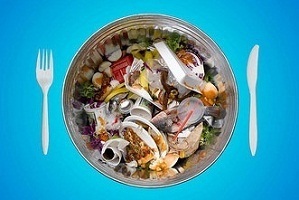
Jonathan Bloom, author of American Wasteland: How America Throws Away Nearly Half of Its Food, visited Notre Dame during No Impact Week to discuss food waste in America and what individuals can do to make a difference. He shared research demonstrating that waste occurs on farms, in supermarkets and restaurants, and in people’s crowded refrigerators. All told, 40% of food in the United States is not eaten. To illustrate just how much food that is, Bloom explained that the food wasted in the U.S. each day could fill the Rose Bowl stadium all the way to the top.
Bloom, a journalist and blogger, met with students for a luncheon at the Geddes Coffeehouse and then spoke to an audience of students, faculty, and staff in the evening. He also met with ND Food Services staff to learn about the strategies being utilized on campus to reduce food waste. Over lunch, Bloom commented that food is wasted in America “primarily because it’s cheap, it’s abundant, and frankly we can afford to waste it.”
Bloom asked his audience to remember the three E’s that describe the problems associated with food waste: Environmental, Ethical, and Economical. The environmental factors come into play due to the amount of oil and water it takes to make food, non-renewable resources being depleted for no purpose if the food is then wasted. There is unquestionably an ethical dimension as well, considering the extent of food insecurity and malnourishment that exists both in our own country and around the world. The economic impact of food waste is also impressive, amounting to $240 billion worth of food being thrown away annually. Even with such staggering statistics, Bloom retains his optimism, saying, “The bad news is that right now we’re pretty darn wasteful. The good news is that we can make an impact if we set our mind to it.”